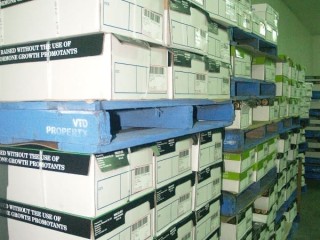 The Government’s carbon tax scheme is already throwing up examples of perverse outcomes and unintended consequences that run counter to its goal of reducing greenhouse gas emissions.
The Government’s carbon tax scheme is already throwing up examples of perverse outcomes and unintended consequences that run counter to its goal of reducing greenhouse gas emissions.
A NSW manufacturer of stock handling equipment says the carbon tax could lead to increased imports of cheaper imported steel from countries that apply less environmental controls to steel production than Australia.
Murray Schaefer of National Livestock Systems uses Australian-made steel to manufacture livestock handling equipment at Rutherford in NSW.
He estimates that about half of the stock handling equipment sold in Australia uses steel manufactured in China.
If the carbon tax pushed up steel, electricity and transport costs, more Australian manufacturers would be forced to use cheaper imported steel and worse environmental outcomes would result.
Global carbon levels would increase, because it required the same amount of electricity to manufacture, cut and weld steel regardless of location, and China’s carbon output to produce a kilowatt of electricity was higher than in Australia.
Additional carbon would be added as the raw materials and finished product were freighted extra thousands of kilometres.
The Chinese product had a shorter life span than Australian-made product so the whole process would have to be repeated more often, Mr Schaefer said.
“In fact, if a carbon tax is imposed, and I am forced to import, then my carbon footprint would effectively triple, and six to eight good loyal Australians would face redundancy,” he said.
“The result is the exact opposite of what the carbon tax proponents are espousing.”
Another example was the move to impose a direct carbon tax on the largest meat processing plants while leaving smaller plants untaxed.
The imposition of significant costs on the larger plants creates a potential incentive for processors to move away from larger and more efficient plants, which runs contrary to the policy’s intention.
The Carbon Farming and Trading Association has described the “additionality” rule of the Carbon Farming Initiative as the “ultimate perverse outcome”.
The ‘additionality’ rule is one of several parameters that will be used to determine whether an abatement activity can earn carbon credits. It holds that credits can only be issued for an activity that would not normally have occurred and therefore provides 'a genuine environmental benefit'.
The association said the rule unfairly penalises Landcare farmers and other progressive landholders who had taken up carbon farming techniques early, and potentially rewards those who have thus far lagged in adopting more sustainable land management practices.
Elsewhere, processors are speculating that the carbon tax could impact the packaging industry in unusual ways.
Many packing cartons used for chilled and frozen beef today are made from recycled cardboard. However the added energy requirement to reconstitute cardboard waste in the recycling process may make that prohibitive under the carbon tax, making it likely that non-recycled cardboard may come back into much greater use.
“It would be the height of irony if a law designed to reduce CO2 emissions in turn makes the industry abandon its strong green credentials in packaging solutions, because of added cost,” one prominent export processor said.
